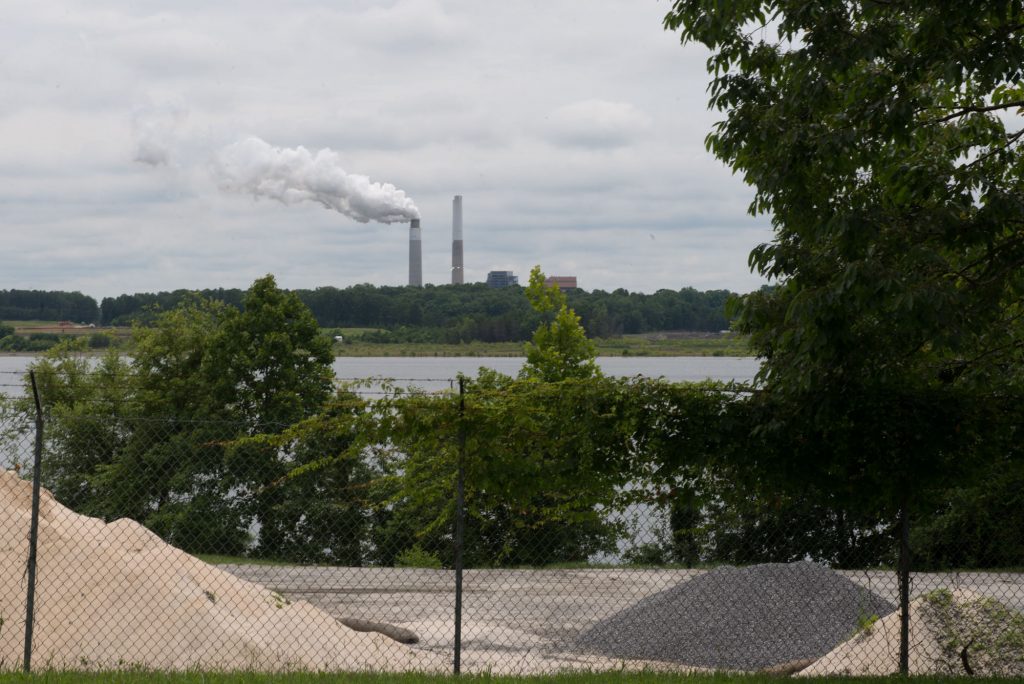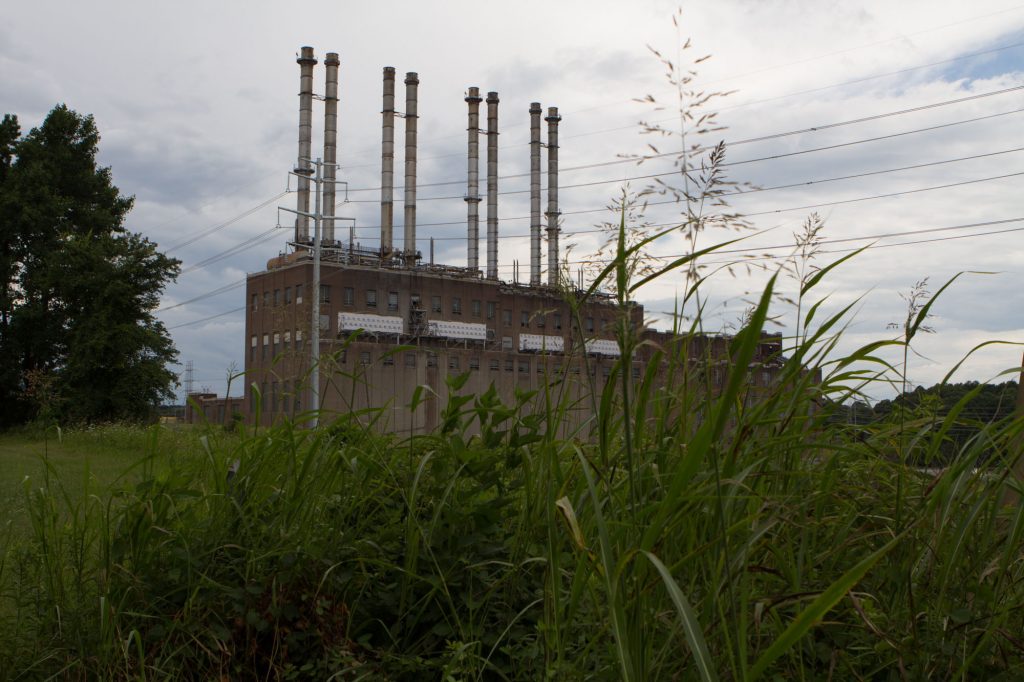N.C. coal ash management: How an environmental disaster became a political one

Belews Creek Steam Station is one of Duke Energy’s largest coal-burning power plants in North Carolina. (Photo by Jasmine Spearing-Bowen/News21)
PHOENIX – On June 1, 2015, then Republican North Carolina Gov. Pat McCrory held a private meeting with environmental regulators and Duke Energy executives at the Governor’s Mansion.
Months before the meeting, state regulators issued Duke a $25 million fine – the largest in state history – for leaks from coal ash ponds into groundwater at the Sutton Plant near Wilmington.
A few months after the meeting, Duke’s fine dropped to $7 million for contaminated groundwater near all of the company’s coal ash ponds statewide.
Coal ash waste – a byproduct of coal-fired power plants – can contaminate groundwater, and ultimately, people’s drinking water with arsenic, mercury, lead and other metals when stored improperly.
“It was not a secret meeting,” said McCrory, who was governor from 2013 to 2017. “I met with a lot of CEOs. I met with their team, and it was actually a very tough meeting.”
McCrory had previously worked at the Charlotte-based electric company for 29 years, primarily in the engineering and recruiting departments. McCrory said he had “no connectivity” to Duke during his time as governor and that his past ties did not affect his decision making.
According to environmental groups and long-serving politicians, Duke Energy has repeatedly warned lawmakers that heavy fines and cleanup costs would cause the company to raise its customers’ billing rates.
“Like others who serve customers, we have an obligation to represent and protect their interests as public policy is made at the local, state and federal level,” Duke said in a statement to News21. “We do so constructively and appropriately.”
“Listen, we levied the largest fine against Duke Energy in North Carolina history, and Duke then appealed the fine,” McCrory said.
“I believe the reason the fine had to be scaled back was due to an email from the (Democratic Gov. Beverly) Perdue administration,” he added, referring to a 2011 memo from the state’s environmental quality agency.
The memo from the N.C. Department of Environment and Natural Resources, which News21 obtained, suggested the agency would be kinder to companies that worked with the water quality division and took necessary steps to comply with state standards. The memo played “some role” in the company’s ability to drop the fine to $7 million, Duke spokeswoman Paige Sheehan said.
McCrory hosted the June 1, 2015, meeting with his chief of staff, general counsel and environmental quality secretary. Duke Energy CEO Lynn Good and three other company executives also attended.
McCrory said he discussed state legislation and a pending court case he had involving the Legislature. He added that Duke sided with lawmakers and was actively opposing him.
Duke declined to reveal the specific contents of its meeting and did not make company executives available for comment.
State lawmakers created the Coal Ash Management Commission in 2014 and gave themselves the power to appoint many of the people onto it. McCrory won a lawsuit against Republican Senate leader Phil Berger, accusing Berger and the General Assembly of overreaching into his executive authority.
The state Supreme Court determined it was unfair for the General Assembly to make the majority of appointments onto the commission. The McCrory administration disbanded the commission within a couple months. Berger did not respond to multiple requests for comment.
“I’m not aware of the company taking a position on the court case related to the Coal Ash Management Commission,” Sheehan said.

Duke Energy continues to excavate coal ash from the Riverbend Steam Station, one of several plants that continue to be cleaned up, in North Carolina. (Photo by Chelsea Rae Ybanez/News21)
Duke holds large influence over lawmakers
Duke Energy is a major driver of North Carolina’s economy, employing 16,000 people and serving more than 3 million customers across the state.
According to Good Jobs First, a national policy resource center tracking environmental damage, the Environmental Protection Agency has fined Duke more than $120 million for 20 environmental violations, including a $102 million penalty for the Dan River coal ash spill – the largest EPA-issued environmental fine against a North Carolina company.
Duke also incurred the state’s largest penalty for environmental damage when it agreed to pay $7 million for groundwater contamination at its coal ash pits statewide and pollution caused from its Sutton Plant in Wilmington.
Though state and federal regulators have held Duke responsible for contamination, Duke has a large influence in the political process.
“Nothing gets passed in the Legislature that they have not signed off on,” said Pricey Harrison, a Democrat from Guilford County who served in the state House since 2005. “I don’t think I’ve ever had an experience where I’ve seen anything that they objected to get passed in the Legislature.”
Coal ash awareness across the state grew after the 2008 Tennessee Valley Authority coal fly ash spill, Harrison said. She feared North Carolina did not have a robust plan for managing coal ash waste, so she introduced bills to ensure the state better handled coal ash management. Though her party controlled the House and Senate at the time, none of the three bills she proposed during the 2009-2010 session became law.
“I did not make a lot of progress even when the Democrats were in charge because Duke Energy resisted pretty strongly any efforts to regulate coal ash,” Harrison said. “They pushed back really hard. I kept filing my bills, and they would go nowhere.”
Dan River spill spurs lawmakers into action
Lawmakers drew greater attention to coal ash in February 2014 after a ruptured Duke storm drain dumped up to 39,000 tons of ash into the Dan River.
McCrory found himself at the center of an issue he had not anticipated addressing in his first year in office.
“With coal ash, it was a 60-year problem, and it was pushed off to the side until an accident occurred. … I frankly had very little knowledge of coal ash until it actually happened,” McCrory said.
Citing the 2015 meeting and the reduction in Duke Energy’s fine, environmental groups criticized the McCrory administration’s handling of coal ash.
“We disagreed with his policies on this very important issue and how he and his appointees were handling a matter of serious public concern,” said Frank Holleman, senior attorney at the Southern Environmental Law Center based in Virginia. “It was nothing personal, nothing about him as a political figure. It was the way he handled this issue and other environmental issues.”
During McCrory’s unsuccessful reelection bid in 2016, the National Resources Defense Council ran frequent attack ads tying McCrory to Duke Energy. One of the more commonly played ads accused McCrory of having coal ash on his hands.
“With any group of politicians, there comes a point politically they feel like they can’t go any further for Duke,” Holleman said. “But so far, we have not hit that point.”
In an election year dominated by Republican victories, McCrory lost to then-Attorney General Roy Cooper by just 10,000 votes. Cooper did not respond to repeated requests for comment about how he plans to address Duke’s coal ash management practices.
Many factors could have swayed the results in McCrory’s favor, but coal ash likely played a role in the outcome.
“Coal ash certainly raised critical concerns in the minds of residents and probably those that lived around the areas affected,” said Michael Bitzer, a political science professor at Catawba College. “That kind of an issue that’s so basic – water – is going to have a direct relatability to any voter.”
Come back Aug. 14 to see the full News21 report on “Troubled Water.”